Tagged: winnipeg
The Third Color at the Prairie Theatre Exchange
- by Alyson Shane
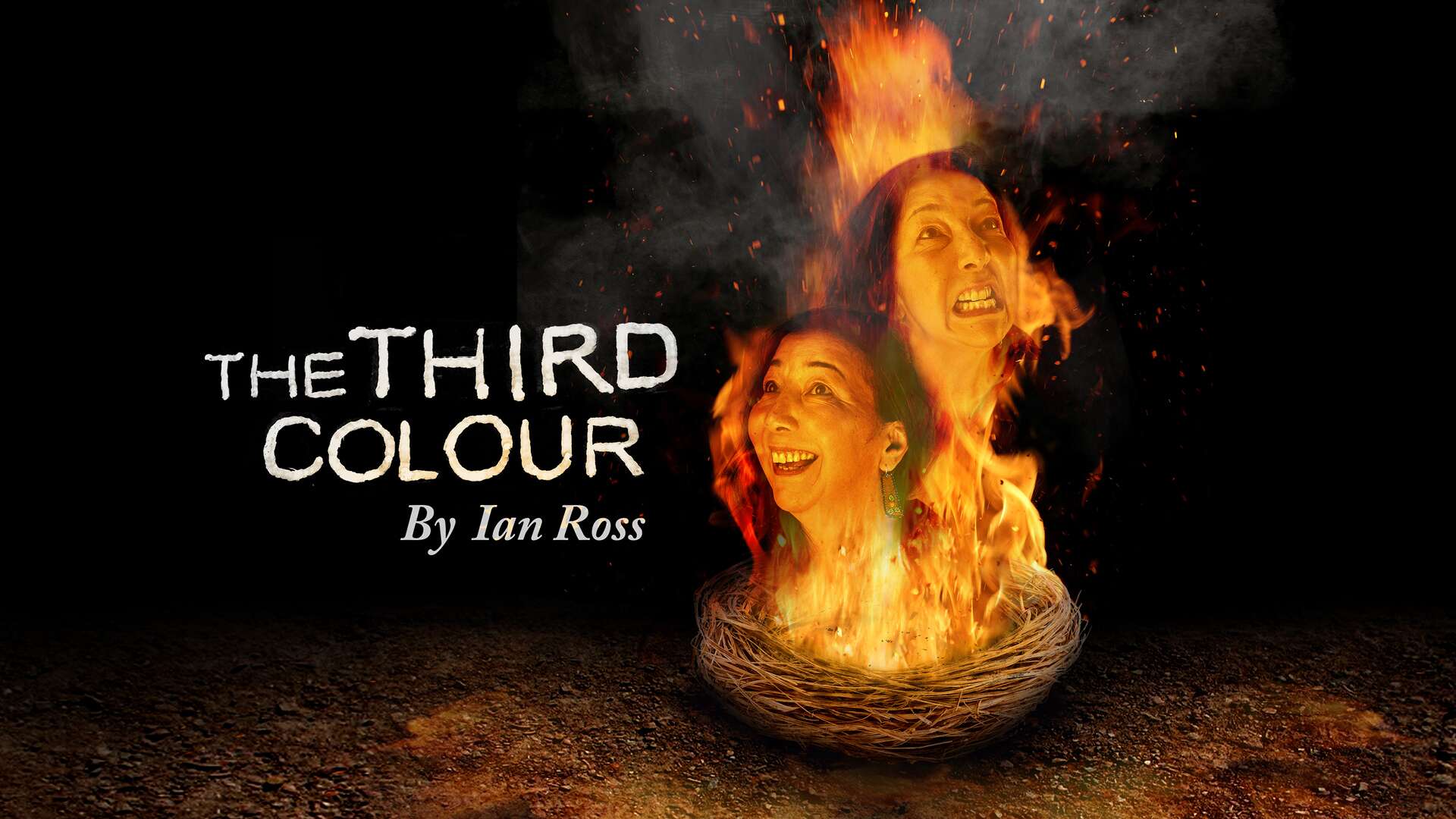
Image via the Prairie Theatre Exchange.
I met Ian Ross a lifetime ago. Or, rather, what feels like a lifetime ago.
We worked in the same building, and when we were introduced our colleague said something to the effect of:
"This is Ian. He's kind of a big deal" and the way he laughed it off and joked about it told me that
1. He was probably kind of a big deal*
2. We'd probably get along
I was in a really bad place at the time, and I leaned on Ian a lot to talk about what I was dealing with, and how frustrated and overwhelmed I often felt about the prospects of my future.
Ian, through the simple act of listening and asking questions (which no "adult" in my life had really done at that point) helped me work through my feelings as I tried to make sense of the world around me.
I was confused. I didn't understand how I'd gotten myself into the mess I found myself in, and I felt at a loss as to the best way forward.
So it was funny, and ironic in a way, that I found myself confronted with those same questions - "how did we get here?" and "what do we do now?" - through the lens of his most recent play The Third Color.
The play focuses on two spirits who have taken the shapes of Indigenous women: Head Full of Lice, played by Kathleen MacLean, and Agatu, played by Tracey Nepinak.
Through dialogue that manages to somehow be sharp, resonant, and often hilarious at the same time, the spirits explore Canada's history from pre-settlers to the present day.
Over and over again, the spirits butt heads (and, in some cases, got into physical skirmishes) over whether or not helping the settlers was, in fact, the right thing to do.
Agatu, who takes the form of an elderly woman, pities the settlers who are sick and need their help. She insists that, even if the outcome isn't what they expect, that it's the "right" thing to do.
Head Full of Lice, on the other hand, is furious. She sees the generational hurt and trauma inflicted upon Indigenous peoples and repeatedly states that she wants to "burn it all down," even going so far as to take out a Canadian flag and threaten to burn it out of rage.
"Where is the third color?" they both ask, looking at the Canadian flag.
Our Canadian flag is red and white. Red is symbolic of England and white of France... but where are the Indigenous peoples in our flag?
Where are their histories? Their stories? Their presence in the literal fabric of our country?
Through their dialogue, Head Full of Lice and Agatu represent opposing viewpoints in terms of reconciliation - should Indigenous peoples accept that "this is what we have" and try to move forward, or should they burn it all down and start again from scratch?
As a non-Indigenous person I have no real understanding of the feelings that Indigenous peoples must feel towards reconciliation in Canada. But through Head Full of Lice and Agatu's discussion I was able to get a glimpse of the complicated - and contradictory - feelings that Indigenous folks like Ian must be experiencing during this period in our history.
Which, I think, is what makes the play such an important contribution to the discussion surrounding the reconciliation attempts happening in Canada right now.
Through its comedy and drama and fierce bouts of emotion, The Third Color represents an important perspective that is timely, relevant, and challenging, while also leaving space for the audience to sit with their feelings, mixed and uncomfortable though they may be.
Art should challenge us to push the limits of our comfort zones, and that's exactly what Agatu and Head Full of Lice do throughout the play.
It made me think of the famous Duke Ellington quote that states: Art should be dangerous.
I couldn't agree more.
The Third Color is playing at the Prairie Theatre Exchange from October 2 - 20. I highly recommend checking it out.
**Big thanks to the PTE for the free tickets, and the chance to see and write about this important piece of art.**
It's busy in Wolseley
- by Alyson Shane
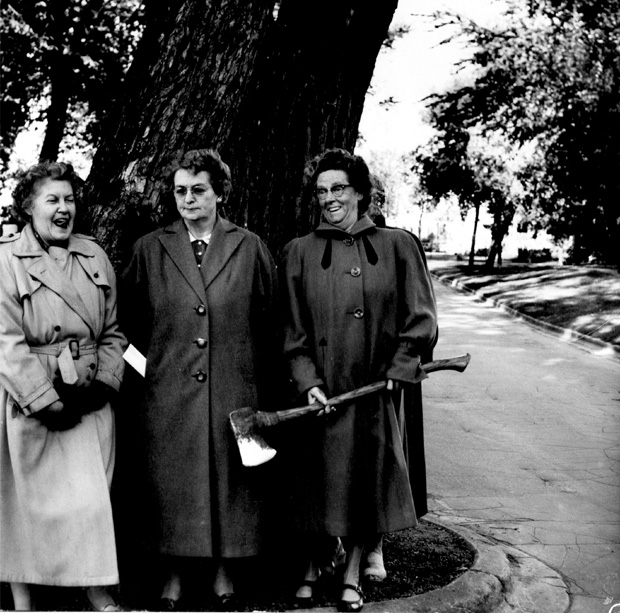
Image of these badass ladies + the Wolseley Elm via the U of M
It's busy in Wolseley
kids are getting picked up from daycare and preschool
or walking home from
Balmoral Hall and Laura Secord
it smells like bread on Sherbrook and Wesminster
where people are waiting for the bus with their groceries
or tying their dogs up next to corner stores
next to houses with dragons on their lawns
next to houses with rainbow fences
along streets lined with
porches and sunrooms and front steps
covered in the shade
of old Dutch elms that haven't succumbed to disease
standing guard over busy streets
filled with Moms and Dads in SUVs
heading home to dinner or soccer practice or dance class
or cyclists on their bikes
in their helmets and backpacks and reflective gear
and I'm in the street on my bike
at a four-way intersection managed by a blinking red light
watching everyone
turn
and cross
and turn
and cross
waving at each other and smiling
and I'm waiting my turn
breathing in deep
trying to remember
the smell of fresh produce from the co-op
mixing with incense from Prairie Sky Books
and how the haze of the early evening light
that filters through the budding leaves
turns everything to gold.
Just fire a cop
- by Alyson Shane
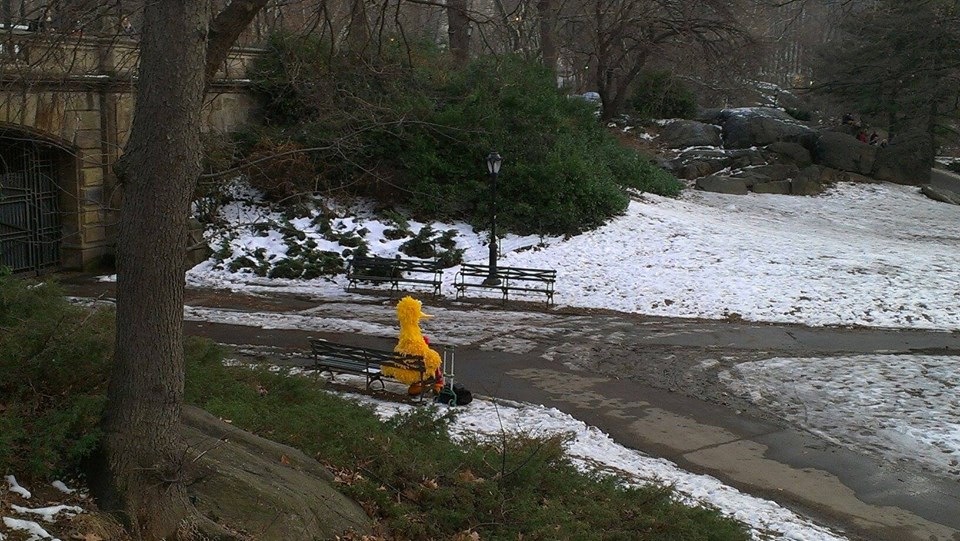
Last Tuesday Colin and I were having a beer at The Yellow Dog and we were talking about the recent uproar in the city over the new $5 charge to attend the hockey playoff street party.
100% of the proceeds from ticket sales are going to fund the United Way's homeless, mental illness, and addictions programs in the city
which, I dunno, seems like a pretty OK thing to do with the money if you ask me
especially considering that one of the major complaints suburbanites have about downtown is that it's filled with drunk homeless people messed up on drugs
(it's not.)
People were posting about this new $5 charge all over the place, and we were talking about how most of them are forgetting that a downtown street party closes several major roads, impacts nearby businesses and services, and requires additional policing, among other things, and paying $5 to support our homeless population isn't really a big ask if you think about it.
It wasn't very crowded in the bar and as we were talking a dude kept looking over at us, and at first I thought he was agreeing with what we were saying because he just sat there and smiled and nodded along, but as we were getting up to pay he turned to me and said:
"Hey, I heard you guys talking about the Whiteout Party tickets. I think that's bullshit, man, that shit should be free!"
So I explained my points about the homeless and street closures and extra policing, and he got this funny look on his face which made me hope that he was going to give me a thoughtful response.
But then he said
"Fuck that, we don't need extra police. Do you know how many tickets you could pay for with a cop's salary?! What do they make, $100,000 a year? JUST FIRE A COP!"
Now generally I try to be considerate of other people's opinions, but that has to be one of the most profoundly stupid things I've ever heard
and I just stood there for a second with a blank look on my face. Then I said "OK cool, enjoy the game" and left, because what do you even say to that?
He clearly has no respect for people who put their lives on the line to keep us safe, and there's no point in trying to reason with someone who has such a loose grasp on how the world works.
Besides, that guy wasn't there to have a real discussion. He was there to wear his Jets jersey, go drink more beer with his buddies at the street party, and enjoy the benefits of a downtown that he clearly has no interest in supporting.
He just comes downtown to party, man.
Which makes him a lot like all the other people who voted 2-1 against allowing pedestrians to cross a street in our downtown
who are suddenly now OK with people getting wasted and stumbling around downtown near high-traffic intersections while disrupting the normal flow of traffic
as long as they're the ones doing it
and as long as they aren't forced to donate five bucks to help the homeless.
But hey, who knows.
Maybe that dude's onto something.
I bet we could fill a lot of potholes with those cop salaries.
What's your relationship with your parents like?
- by Alyson Shane
If you're like me, or even like a lot of other people out there, then you probably have a somewhat complicated relationship with your parents.
These conflicts and complications happen because dynamics are difficult to navigate; it's hard to be emotionally connected and love someone who may be vastly different from you, or who hurts you, confuses you, or struggles to connect with you emotionally.
As children, it falls on our shoulders to try to understand and unpack our parents:
What decisions and life experiences led them to this place in life?
How did these experiences shape their personalities and parenting style?
What can we do to bridge the gap between their values and beliefs, and those of a new generation?
(I think about these things a lot, in case you haven't noticed.)
Someone else who clearly thinks about these things a lot is Tetsuro Shigematsu, the performer behind the play Empire of the Son, which is currently playing at the Prairie Theatre Exchange.
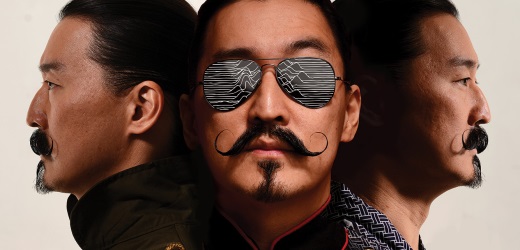
Image via the Prairie Theatre Exchange
Empire of the Son is a one-man show written and performed by Tetsuro Shigematsu (former host of CBC Radio One’s The Roundup) which employs a variety of mediums from monologues, to video, recorded audio, to live-action video using miniature sets, and more, to explore the complex relationship between himself and his father, also a CBC broadcaster.
Or, as the poster so aptly put it: Two Generations and the Silence Between Them (how perfect is this description, by the way?)
The play focuses on Shigematsu's emotionally distant father, Akira, and his struggle to reconcile his father's lasting impact through his work as a radio broadcaster for the BBC and CBC, and how emotionally distant and reserved he was with his family.
I'll be honest: I typically have a hard time getting into one-man shows as I tend to find the disconnect when an actor switches between characters to be rather jarring, but there was a distinct physical difference between when Shigematsu was "Tetsuro" and when he was acting as "Akira" that may have turned me into a one-man show convert:
Shigematsu's impressions of his father seemed to take over his whole body; his posture changed, his facial expressions changed, and his inflection and pronunciation were so dramatically different from the jovial person telling the story that it often felt like there was another person onstage, entirely.
At the same time, you could tell that these impressions, and his ability to deliver them so effectively, were crafted with the kind of love and intimate knowledge that only very close family members and friends tend to have with one another.
As Shigematsu led us through his father's life we came to understand the contradiction he felt about his father: for someone who broadcasted to the world and regularly talked to people across the globe, he struggled to open up to and connect emotionally with his own children.
It's revealed that though his father was an influential figure and led a storied life which included some astounding moments (having tea with the Queen, being present in the room when Marilyn Monroe serenaded JFK, and - most notably - being in Hiroshima when the atomic bomb was dropped) Shigematsu only began to 'real' conversations with his father when he began interviewing him towards the end of his life.
This contrast hit home, and served as a reminder that, often, the most we know of previous generations is what they choose to share, and unless we take the time to tease it out of them, their stories and experiences may be lost forever.
(As someone who studied oral history in university, I found this fascinating, by the way.)

Image via the Prairie Theatre Exchange
This intimate solo performance was enhanced by Shigematsu's larger-than-life stage presence and his interesting use of a camera and miniature props located on a long table onstage. A DSLR camera (I think) was strapped to it, and at times Shigematsu would move casually over to the table, arrange some of the tiny props, and stream the live video camera footage to the screen behind him.
If this sounds strange, it was - but that only enhanced how effective this method of adding an additional visual layer was to the overall story. Personally, I've never seen someone manage to imitate two different people and move around on a miniature skateboard with just their middle ad index fingers, have you?
At the outset of the performance Shigematsu shares that he hasn't cried since he was a child, and shared his hope that performing this story in front of an audience would help him do so.
Personally, I shed enough tears for both Shigematsu and myself.
This poignant, captivating and strikingly funny memoir is one that I highly recommend seeing.
Additionally, we were lucky enough to catch Empire of the Son on the night of the Prairie Theatre Exchange's Leap Series, a new event in partnership with Manitoba Music focusing on out-of-the-box plays and music from local artists. If you're looking for a date night, or an opportunity to dive into the world of independent theatre, make sure to check out their next Leap Series event happening in February (and say hi to me if you do!)
**Big thanks to the folks at the Prairie Theatre Exchange for giving me free tickets to see their 2018/2019 season in exchange for these posts. It's a wonderful treat to be able to support and promote Winnipeg's independent theatres.**
Saw the funniest, saddest play the other day
- by Alyson Shane

"Happy Place" is playing at the Prairie Theatre Exchange right now and John and I checked it out on opening night last week. I try not to do any research into the shows before we see them so I don't go in with any expectations, and to date it hasn't done me wrong.
"Happy Place" is a play about a group of women who, for one reason of another, all find themselves in an in-patient centre as a result of various types of trauma.
Based on that description you'd probably expect to cry more than you'd laugh, but I don't know if that's quite the case with this play.
The play begins by introducing Samira, a young woman who starts out being withdrawn and quiet around the other patients, and around their doctor, Louise. Over the course of the play we learn that Samira has been sexually abused, at one point through a gut-wrenching monologue that was, honestly, hard to hear.
Other characters include Mildred, the shit-disturber who provides a lot of the comedic relief through her sassy, no-bullshit personality; Rosemary, who is reserved and somewhat condescending; Kathleen, who has also been sexually abused; Nina, who is tightly-wound and whose psyche feels frayed; and Joyce, who spends most of her time being a nosy busybody who one-ups everyone so thoughtlessly that it almost seems like she does so without thinking.
The set was simple: a raised platform with areas off to the side representing the "rooms" the women stayed in. At first it almost felt too simple, but as the play progressed the use of lighting created a surprisingly dynamic and engaging stage setup.
I feel like "Happy Place" is important for several reasons.
The play explores the various ways women can be abused, manipulated, overpowered, and the deep underlying sense of shame and low self-worth that these experiences breed inside of us.
The short scenes and choppy, fragmented way in which the story was told reminded me a lot of what it was like in therapy: short outbursts of extreme emotion that often left you feeling more empty than whole and fulfilled.
There were several group scenes which stood out, including one where Louise asks the women to create a collage of their "happy place" which - I won't go into too much detail here - but this also hit home in a surprisingly profound way as the characters discussed their reactions to the concept of a "happy place".
I cried so hard while watching "Happy Place" that I started to worry about my mascara and eyeliner giving me raccoon eyes.
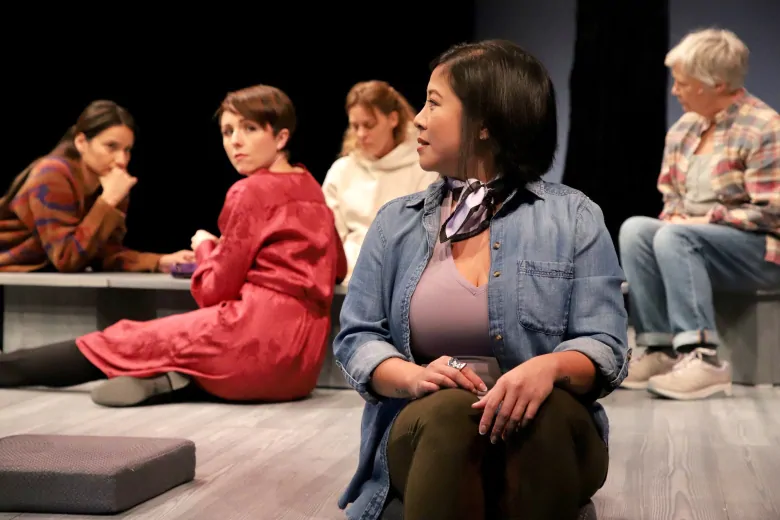
As each of the characters began to process her own trauma, and the role she played in creating or enabling the issue I, and other people in the audience, started to break down.
At one point Joyce, whose constant need to one-up everyone around her had reminded me so much of my mom and my Nan (my mom's mother, ironically also named Joyce) floored me by saying
"I'm not depressed because my husband left me... my husband left me because I'm depressed."
It's not often that a character in a play puts words to your deepest, darkest fear.
I don't think I was quite ready for it. I started crying and had to work to restrain myself from flat-out ugly-crying in the middle of the theatre. I held onto John's hand so tight and saw that he was crying, too.
Most everyone in the theatre was full-on crying by that point, I think.
Which speaks volumes about the play, and its playwright Pamela Mala Sinha. Being able to peel back layers of fear and self-judgment for the things we are ashamed of, or wish we could undo, or forget onstage is a magnificent (if not somewhat off-putting for how personal it felt) feat, and a deeply powerful and moving experience to watch acted out onstage.
"Happy Place" is playing at the PTE until November 25, 2018, and even though I've spent most of this post talking about how sad it was, and how much I cried... that's precisely why you should grab a ticket (or two, it's good to cry with a friend) while it's still playing.
It's not every day that a play touches you as deeply as this one touched me, and based on the sniffling and tissues going around the venue, I doubt I was the only one who felt that way.
**Big thanks to the folks at the Prairie Theatre Exchange for giving me free tickets to see their 2018/2019 season in exchange for these posts. It's a wonderful treat to be able to support and promote Winnipeg's independent theatres.**
The election is over so I can use the internet again
- by Alyson Shane
Just kidding, I never stopped using the internet.
But in the weeks leading up to the election I found myself dreading looking at social media, and at the deluge of inflammatory comments, straw man arguments, and overall negativity aimed at the Coalition for Portage and Main (aka 'VoteOpen') of which I was a spokesperson during the recent election.
I'm going to talk about that experience as frankly as I can because that's what I've always tried to do. Maybe this will hurt your feelings. Maybe this will piss you off. Maybe you'll agree with me. Maybe some of this will ring true to you.
Who knows.
Here goes.
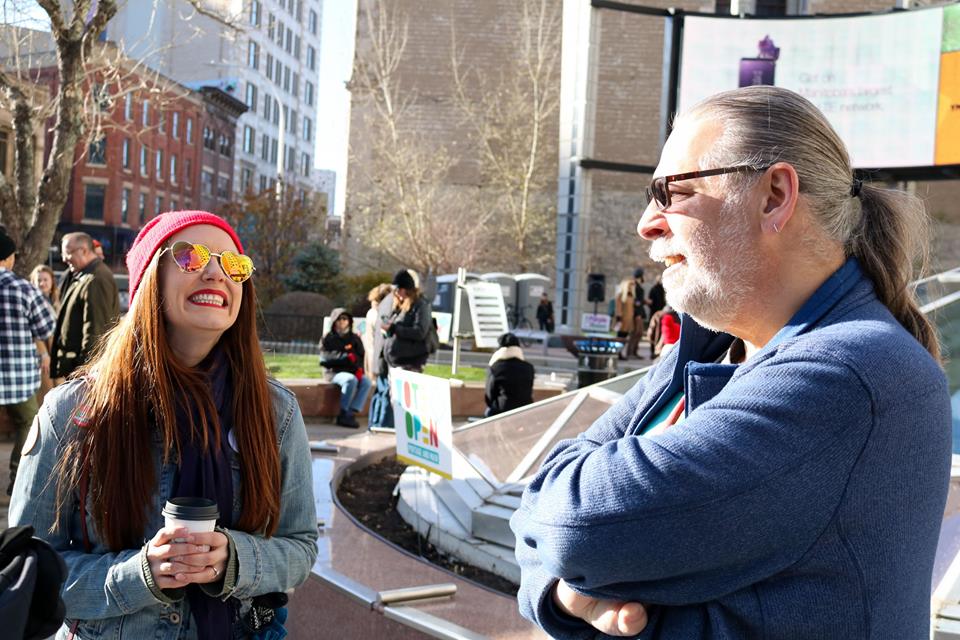
The Good
As a member of VoteOpen I got to know some of the most passionate and dedicated people I've ever met.
As a business owner I have the privilege of regularly meeting interesting and motivated people as part of what I do, but it's not often that I've had the good fortune to be in a room with so many people who fit that bill on an ongoing basis.
The VoteOpen committee meetings each Friday afternoon became one of the highlights of my week (especially the post-meeting cocktails). I got to know smart and thoughtful people like Adam Dooley, Ian McCausland, Anders Swanson, Wil Belford, Glen fucking Murray, Adam Duguay, Brent Bellamy, and a whole lot more who brought creativity and great ideas to every meeting.
I met dozens of volunteers who weren't on the committee, but who donated time on evenings, weekends, and during their workdays to advocate for a cause they believed in.
I spoke to passionate Winnipeggers on a daily basis who believe that the best downtowns are accessible, pedestrian-focused, and who share the same vision of my city as I do.
I got to be on podcasts, on the radio, and on the news multiple times as a spokesperson, which sharpened my chops and helped me become a more confident public speaker.
I tabled at my alma mater and got to engage with university students about the civic process, and talk to them about the kind of city they want to live in.
I gave a talk at Design Winnipeg's 10x20x20 where people cheered for our message.
That one felt good.
A local "journalist" (heavy quotations) blocked me on Twitter after I repeatedly asked him why he was going after a group of volunteers instead of holding City Hall accountable for keeping the public uninformed about the impact of the plebiscite vote.
Instead of explaining his reasons, he blocked me.
Does that one get me a badge? I feel like it should.
Then, near the end of it all, I got to attend OpenFest, a free public concert where my favourite local band played my favourite song in support of a cause I believe in, and which I campaigned for.
That was a really good night.
The Bad
At the end of the day, the city voted 2-to-1 to keep the intersection closed. Obviously I'm disappointed with the outcome; how could I not be, really?
But the thing that disappointed me the most was how little our elected officials did to keep the public informed about an issue that will continue to shape the future of our downtown.
Instead of leading the discussion, our Mayor (who initially campaigned on reopening the intersection, by the way) and City Council left it to a group of volunteers to try and do their work for them.
This would have been a great moment for the incumbent (and now second-term) mayor to lead the discussion and showcase the vision of the 'City of a Million' he led with during his initial bid for mayor back in 2014.
It would also have been a great opportunity for City Council members to - at the very least - make the information regarding the Portage & Main more readily available and understandable so the people living in their wards could make informed decisions about the future of the city they live in.
Unfortunately that would require some vision and consideration for their electorate, neither of which I've seen around City Hall recently.
Dan Lett wrote a wonderful piece in the Winnipeg Free Press articulating what a farce this entire plebiscite vote was, so I won't repeat it here, but suffice it to say we were fighting an uphill battle from the start, and one that was deliberately stacked against people who support and believe in our downtown.
Honestly though, the worst part was watching my city turn its back on progress.
As a recent New York Times article pointed out, all over Canada and elsewhere cities are revamping their downtowns to focus on pedestrian foot traffic, transit and cycling infrastructure, and business development to reinvigorate decaying downtowns and wean ourselves off of our dependance on single-person vehicles and fossil fuel.
Except here in Winnipeg.
In Winnipeg, the car is still king, even though it shouldn't be.
**Edit**
(Don't give me any blowback about the "cold winters," please. I've lived in this city for most of my life and I've never owned a car. I walk or bike when it's warm enough [which is actually most of the year] and in the winter I take transit, or a Tapp Car, and I get by just fine. So do many other people I know. So that excuse is moot as far as I'm concerned.)
The Ugly
One of the most frustrating parts of this experience has been the repeated accusations and insults hurled at a group of people who are volunteering their time to try and effect positive change for our city.
I repeat: we were volunteers with no political experience doing the best we could with limited time, resources, and information.
We did our best to convey information from sources like 90-page reports, documentation about local transit, etc. in a succinct and effective manner, but that shit is hard, and doubly so when the majority of "no" voters we engaged with continued to accuse us of deliberately trying to mislead the public, or of "not providing them with enough information."
Because here's the thing: we had all the same information as everyone else in this city. We just took the time to read through it all (or most of it) while the majority of voters decided not to.
(And if you didn't, that's fine. But people in glass houses shouldn't throw stones.)
Specifically, however, I want to touch on a troubling component of this campaign, which is that the VoteOpen folks were held to a significantly higher moral standard than the "no" side and our local politicians.
A local politician called us "elitists" (which is laughable - I rent my home and don't own a car. I'm hardly "elite" by anyone's standards), our local smear "journalist" called us "arrogant," and I've had more people accuse us of being condescending or of "talking down to people" than I've ever heard in my life.
(And I grew up in an abusive household, so I know what it feels like to be talked down to, or to be made to feel small or stupid on purpose.)
I helped manage the VoteOpen social accounts, so I can say with certainty that we always strove to be respectful in our messaging, and to rely on facts and data whenever possible while also trying to paint a picture of what our downtown could be.
However, the one talking point that seemed to really incense people is this:
The general public are not informed enough to vote directly on matters of public policy.
This one confused me, because here's the thing: it's OK to be uninformed.
Being "uninformed" doesn't mean someone is stupid - which is what a lot of people seem to think it means for some reason - it means we haven't learned as much about a subject as we could, and that's totally okay.
But the impact public policy projects - from The Forks, to The MTS Centre, to The Floodway (aka "Duff's Ditch"), just to name a few local ones - is hard to convey because it's hard to get people to think "big picture" at a civic and multigenerational level if they've never had to before. And that's okay. We all start somewhere (and I can say this from experience).
That's why VoteOpen consistently linked to relevant data, facts, and opinion pieces from urban planners who spend their lives studying the effects of areas like Portage & Main whenever we could.
We did this not to make other people feel small, but because we were trying to avoid getting into rhetorical arguments, or from using logical fallacies whenever possible.
We stuck to the facts whenever we could because the facts are how we make informed decisions, both in our personal and public lives.
The "no" side, however chose to hurl insults at us, leave negative or rude comments, or tell us that they hope people die if the intersection is reopened.
Here's a small sampling:
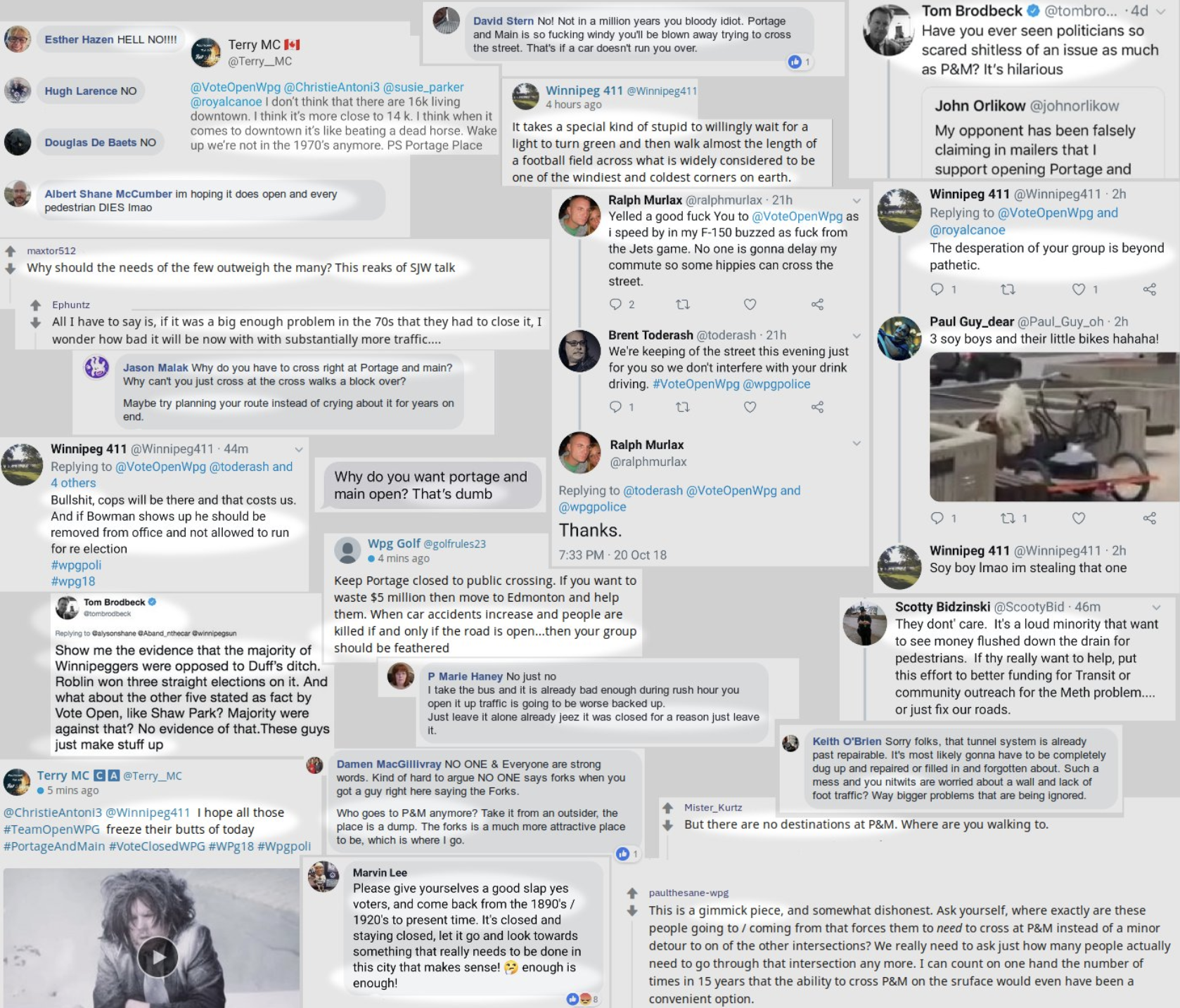
These two stand out:
"When car accidents increase and people are killed if and only if the road is open... then your group should be feathered."
and
"Im hoping it does open and every pedestrian DIES lmao"
I heard this sentiment a lot: people commenting and saying they hope people die so VoteOpen will "learn a lesson" or that they can't wait to see the bodies at Portage & Main.
What the actual fuck, people. These kinds of attitudes and comments are extremely alarming. Would you want to live in a city where people think this way about you?
But my point is that we were repeatedly dragged over the coals for engaging in what was always intended to be respectful and civil public discourse, while the "no" side had a field day and wasn't held to the same moral standard.
We weren't perfect, of course - this was an emotional election and both sides got worked up - but I can say with certainty that everyone officially associated with VoteOpen always did their best to be respectful to everyone we engaged with.
I know from experience that that wasn't the case on the other side of the aisle, and seeing such an ugly and repulsive side of my city really started to wear me out as the campaign dragged on.
Moving Forward
Despite the result of the plebiscite (which is non-binding, by the way) I doubt that the discussion about Portage & Main is over.
We already know that millions still need to be spent to repair the underground concourse, which is infested with mold and decaying (as concrete tends to do after 40 years) so the barricades will come down anyway... and frankly it seems stupid and small-minded to simply put them back up again after we spent millions taking them down.
I guess we'll see.
At the outset of this whole debacle I said that the Portage & Main debate is an embarrassment to Winnipeg, and even after being called "arrogant" I still stand by that statement.
It was embarrassing to have to work so hard just to try and get people to say "yes" to opening an intersection.
It was embarrassing to hear people in my city dismiss people with accessibility issues who stated that the intersection didn't let them cross the street with dignity.
It was embarrassing to hear people make fun of and dismiss women who expressed concern for their safety while navigating the underground concourse alone or at night.
I felt embarrassed of my city when I spoke to individuals from elsewhere who didn't understand why people were fighting to keep people from crossing the street.
The most embarrassing part was seeing firsthand that many people who live in this city don't care about the health and well-being of the place we call 'home' if it affects their commute in any way whatsoever.
Actually, that was equal parts depressing and embarrassing.
Our downtown deserves better than to be a thoroughfare between one suburb and the next.
Still Feeling Hopeful
Despite all of the negativity, what this experience taught me was that the tides are changing in my city. Things are changing slowly, and from the centre out (as is typically the case with cities, it seems), but things are changing.
This is especially true among the younger demographic, who are spending more and more time downtown, and in the surrounding areas like The Exchange District and The Forks.
When tabling at the University of Winnipeg the majority of the students I talked to were open to the idea of a walkable and vibrant downtown, and saw Portage & Main as a key point to making that happen because they wanted a city that they could be proud of.
That was inspiring.
Because here's the thing: you can't stop progress.
Sure, you can slow it down. You can try and get in the way. But progress always wins out because eventually people will want to start replicating the success stories we see and read about in other North American cities.
Hopefully we can get some real leadership and vision in City Hall sooner than later, and the next round of politicians in the civic election will do a more effective job of communicating a vision of the kind of vibrant, safe, and accessible downtown that we and future generations deserve to be able to enjoy and experience.
Winnipeg will get there, eventually.
And I, for one, am happy to keep leading the charge for progress.
See you around, Winnipeg.
Saw Prairie Nurse at the Prairie Theatre Exchange last week
- by Alyson Shane
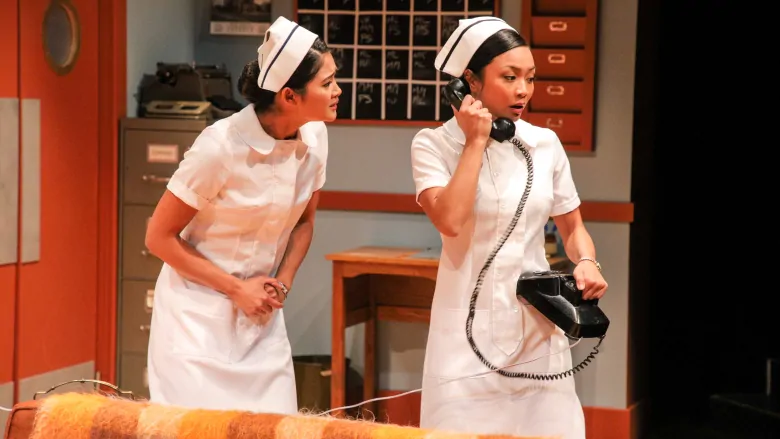
(Photo via Leif Norman)
It's a weird, funny screwball comedy and if you're looking to have an excuse to forget all the weird, messed-up stuff happening in the world right now and have a couple of good belly laughs, then this is the play for you.
I typically try not to do any preliminary research before going to a play at the PTE so I can go in without any expectations, and to date I continue to be pleasantly surprised by the quality of the plays, storytelling, and acting brought to life onstage each season.
The first thing that stood out to me when we sat down for Prairie Nurse was the set: usually plays at the Prairie Theatre Exchange (in my experience, anyway) tend to have more stripped-down sets, and rely on the audience's imagination to fill in the blanks.
Not that I'm complaining, mind you. I enjoyed the set a lot; in particular the lockers and the Formica table set gave everything a weird, home-y feeling. Even though the set was intended to represent the hospital staff room, it did a great job of conveying that this was the space were the characters "lived" when not working in the hospital. I loved it.
The play starts with several of the staff at a hospital in rural Saskatchewan anxiously awaiting the arrival of two new nurses who are moving to Canada from The Philippines.
The plot felt especially pertinent given than Winnipeg is home to one of the largest and most established Filipino populations in Canada, but even though the play tackles a lot of quirks and assumptions that can occur when different cultures clash for the first time, the play does a great job of speaking to anyone who has ever felt misunderstood, or out of place.
The plot of the play follows Puring (short for Purificacion) and Penny (for Indepencia), two women from the Philippines who come to a small-town Saskatchewan hospital to work as nurses during the 1960s.
The recurring problem that the hospital staff have, and what ultimately proves to be one of the major plot devices as well as one of the primary recurring jokes, can't tell the two nurses apart.
Of course, this inability by the hospital staff to tell the new nurses apart results in a variety of silly hijinks
(side note: so happy to finally have an excuse to use the word 'hijinks' in a written sentence on my blog)
which are only enhanced by the slapstick-style action of people entering through one door while someone exits another, jokes about how cold Canada is (of course), mispronunciations, and a variety of other jokes that I won't go into here for fear of spoilers.
One thing that stood out was how quietly the play addressed different, more subtle forms of racism. For example the hospital staff have a hard time telling the conservative and shy Puring, who comes from a rural community, apart from the outgoing Penny, who hails from Manila and has a decidedly more... shall we say, entitled personality.
One of the best characters was actually a supporting one: Dr. McGreggor, a Scottish doctor so obsessed with hunting and fishing that he'd pretty much rather be anywhere else than in the hospital delivering babies and tending to patients.
Overall Prairie Nurse was a charming and touching story not just of overcoming cultural differences, but also of the very human experience of trying to fit into a new place, and or trying to adapt to a changing one.
Prairie Nurse was a really lovely way to kickoff the 2018/2019 play season. I'm excited to see what the Prairie Theatre Exchange does next!
Changed a bunch of minds today
- by Alyson Shane
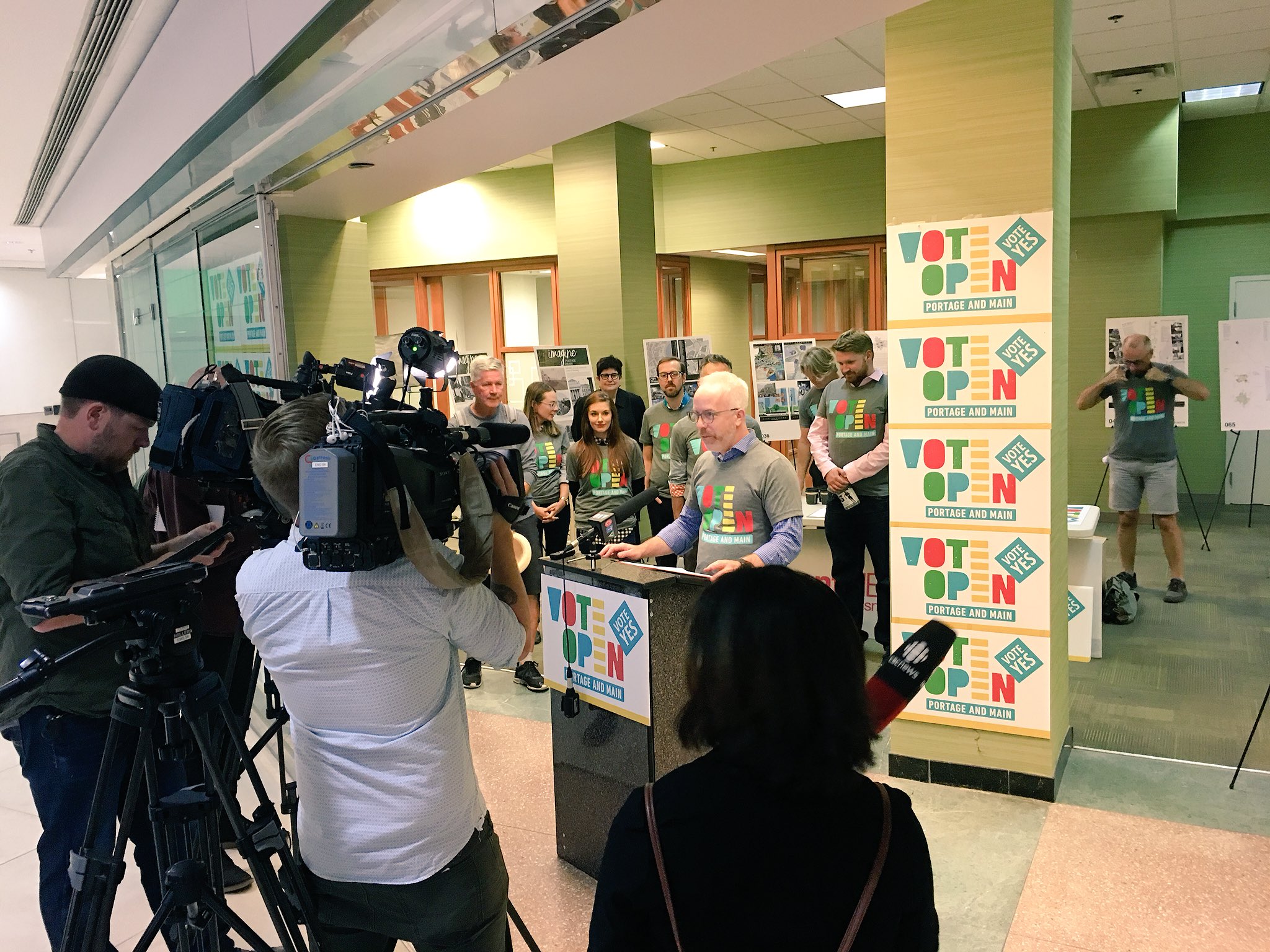
Never underestimate how much can be accomplished by having a positive, civil conversation with a stranger. I'm serious.
The VoteOpen storefront location opened up today at 201 Portage and so naturally yr girl was there to do interviews and hand out lawn signs and literature and tshirts, and also to talk to people walking by about what they thought about this polarizing issue.
I stood in the underground concourse for over an hour and changed the minds of nine of the "no" votes and talked to at least two dozen people who were already voting "yes" in the referendum in October.
Some people were rude and mean, but at least nobody told me to fuck off like the people at the First Friday event over the weekend.
Canvassing for a cause isn't for the thin-skinned, that's for sure.
I had a woman tell me that being assaulted in one of the stairwells when I was a teenager was "my fault" and that because she, personally, had never felt unsafe downtown then no woman should.
Which is an opinion she is entitled to.
Even if it's wrong.
But overwhelmingly the people I've spoken to have been open-minded and willing to engage in the discussion, which is rare and strange and to be honest not what I expected going into this campaign.
I under-estimated a lot of the people in my city, and that's okay.
Let's just hope the rest of the population proves to be as open-minded and progressive as the people I spoke to today.
Because those are the people who are going to move our city forward.
And, damn it, Winnipeg deserves to move forward.
Was in a video shoot today
- by Alyson Shane
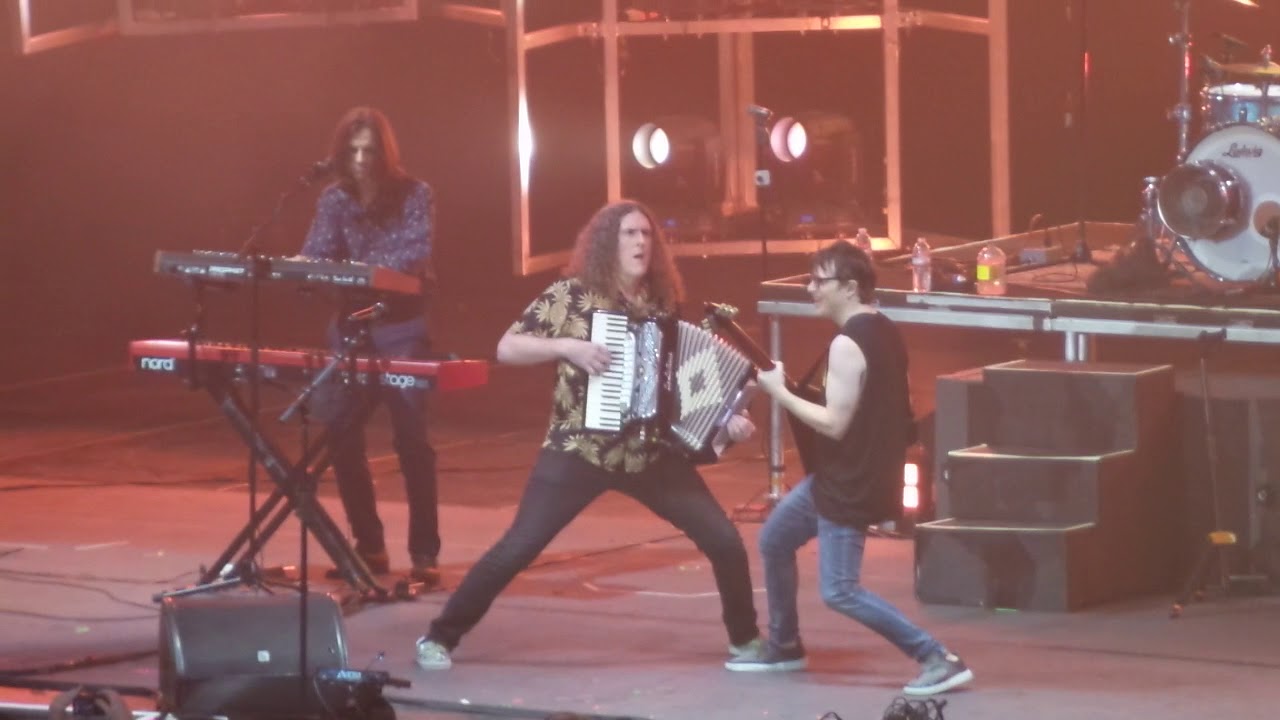
It's going to be in the upcoming promo piece for VoteOpenWPG which I'm pumped about.
I've been working with some really amazing and dedicated people on this project and I really want to see it succeed, so even though it was like +30C today I slapped some waterproof makeup on my face and sat in the blazing sun looking like I was having a good time in front of the camera and drinking free beer.
Life's tough, I know.
It's still stupid hot so we ordered Deluxe Vermicelli from Viva which is a place in the West End that John and I both really like.
We even ordered spring rolls too omg.
It's during these super-hot muggy days that people say things like
"it's too hot"
even though everyone already knows it's too hot, but it feels good to point it out anyway and have yr friends go "yeah totally, it's way too hot."
So everybody likes to do it.
But every time I want to say it, it I remember what Jon Snow said:
"winter is coming"
and whenever I start to feel cranky because I'm sweaty or my hair starts to feel heavy and cumbersome or my forehead starts to feel sticky I try to remember
blizzards
and snow plows
and ice
and spending 10 minutes getting dressed to leave the damn house
and I stfu and sip my free beer and pretend like my skin isn't on fire in the blazing prairie sun.
God I love summer.
The Portage and Main debate is an embarrassment to Winnipeg
- by Alyson Shane
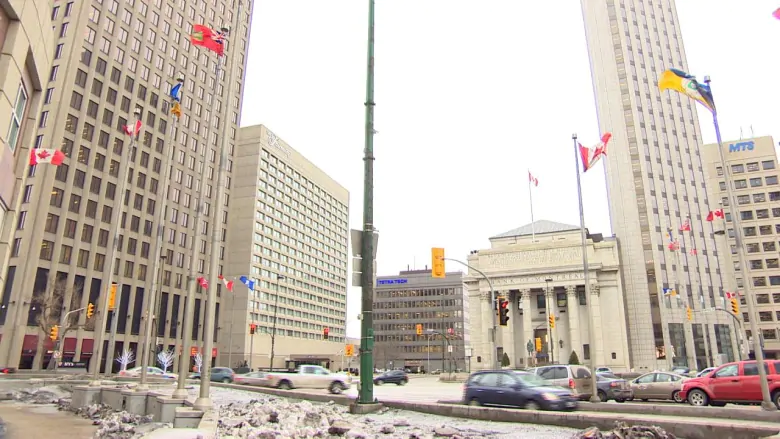
Image via CBC Manitoba
I've tried to stay out of this debate here on my blog. Though I have very strong political opinions I often find that it's easier (and more effective) to engage in conversations with people via social media where we can have an ongoing dialogue vs. writing it all out.
But today's news that there will be a referendum on whether or not we should reopen the intersection to pedestrians is pandering to the narrow-minded and defeatist attitudes that have plagued our city for far too long.
So today I want to provide some historical context for why we're in this mess, debunk some of the false facts being circulated by opponents of the project, and address some of the important moral issues associated with the way people view this issue that I don't think many arguing against the initiative have considered to date.
Some Quick Historical Context
Many people have cited "safety concerns" as the main reason for closing the intersection, which isn't quite true. As a CBC article recently reported, closing the intersection and funneling pedestrians underground was more of a "last ditch" effort to rejuvenate a dying downtown with a big infrastructure project than anything else.
One of the key points in the article reads: "Some of those decisions were based on the fact the city had just, in 1972, amalgamated with 13 surrounding municipalities to create a much larger metro centre."
I'd go as far as to say that the 'Unicity' decision of this time was the worst decision Winnipeg has made to date.
Allowing communities who have no vested interest in the well-being of Winnipeg's downtown, and who have continued to vote against urban development and renewal projects since the 70's, has been one of the primary factors in keeping Winnipeg from achieving true greatness as a city.
Why Some People Think Portage & Main Shouldn't Reopen
Below are a few "arguments" I've heard against reopening the intersection that I'd like to debunk before we go further:
"The intersection is unsafe and people will die!"
Not true. According to the 2016 Annual Collision Report from the City of Winnipeg, fatal collisions only made up 0.10% of all motor vehicle collisions that year. This means that of the 17,586 collisions that occurred that year, 18 were fatal. Of those 18 fatal collisions, only 6 (0.034%) occurred at intersections, and only 4 (0.022%) were with pedestrians.
So if we break down the data we can see that not only are pedestrians quite safe compared to people behind the wheel, but also that intersection-based collisions make up a tiny fraction of collisions and deaths due to motor vehicle accidents.
(For those interested, the overwhelming majority of motor vehicle accidents in 2016 - 39.71%, in fact - were from rear-ending someone. Slow down, people.)
So if this has been the argument you've been using, stop now because you're basing your opinion on false facts and data.
"Reopening will slow my commute!"
Also not true. According to a study issued on the topic, "50 percent of the automobiles passing through the intersection will be 'unaffected by the changes, with no difference in travel time.'"
According to that same report, if your commute is one that will be affected by the opening of the intersection you can expect to see a >50 second increase in your commute, on average.
So if you use this argument then it's time to admit that adding an average of two more minutes each day to your commute is more important than the overall health and well-being of the city you live in.
"The concourse should be good enough!"
Again, not true. Going underground and attempting to navigate the concourse is time-consuming and confusing, not just for city residents (myself included; I've gotten turned-around down there more than once) but for newcomers to the city and tourists, as well.
This argument also ignores the fact that while the concourse may be a passable option for able-bodied people, the same study found that it takes someone with a physical disability an average increase of 129% longer to travel the same distance as an able-bodied person.
If you use a wheelchair or scooter and need to take an elevator, you need to take a minimum of 4 elevators to get where you're going.
So if you use this argument then you need to take a long, hard look in the mirror and get okay with the fact that you're saying that 15.6% of our population (aka 145,270 people as of 2012) don't matter, or matter less than your car.
"Winnipeg isn't [insert city here]!"
No, it's not. Just like any city we have our challenges and hurdles, but the driving factor behind our sluggish growth and downtown rejuvenation is that we keep voting against urban development projects that are in our collective best interest.
So if this is the argument you're using then it's time to face the fact that if you actually want Winnipeg to be like any of these cities it's time to stop naysaying and take a proactive approach to how Winnipeg can be like the city you wish it was.
"This money would be better spent on roads!"
This is the single biggest argument Winnipeggers make against anything we disagree with because roads are something we interact with every day.
Here's the thing, though: Portage and Main are both roads, and the intersection plays an important role in the overall flow of traffic and infrastructure in our city.
This cycle of Drive, Repair, Repeat has gotten us nowhere in the last few decades, and by insisting that we prioritize roads and cars over everything else in our city we've allowed our downtown neighbourhoods to crumble and be neglected as a result.
Additionally, the City of Winnipeg spent a record amount this year on road repair and infrastructure projects outside this initiative. So if this is the argument you've been using, it's time to accept that you care more about the roads you drive on than the city you live in.
"Nobody cares about walking downtown, anyway!"
This is also untrue. Over 17,000 people live downtown as of 2015, and I'd wager a guess that these people would like to live in a place that feels walkable, accessible, and safe. After all, wouldn't you?
There are lots of books and studies that have proven that investing in pedestrian-friendly downtown cores are not only good for the people who live there, but that the cities benefit overall as a result.
Here are some stats to back that up:
- Fewer young people want cars. In 1995 people age 21 to 30 drove 21 percent of all miles driven in the U.S.; in 2009 it was 14 percent, despite consistent growth of the age group. Living car-free in walkable areas fits younger lifestyles. [Advertising Age, 2010]
- A one-point increase in Walk Score [based on number of destinations within a short distance] is associated with between a $700 and $3,000 increase in home values. [CEOs for Cities, 2009]
- A 10-point increase in Walk Score increases commercial property values by 5 percent to 8 percent. [University of Arizona & Indiana University, 2010]
- People living in walkable areas trust neighbors more, participate in community projects and volunteer more than in non-walkable areas. [University of New Hampshire, 2010]
- Pedestrian space designed to be accessible to all sidewalk users, including pregnant women and people with physical disabilities, is especially important because those with limited ability are not able to use other transportation options (U.S. Department of Transportation, 2001)
These stats illustrate why increasing pedestrian activity downtown and reimagining Portage and Main as a place for people, not just for cars, can play a pivotal role in bringing more people downtown and making our downtown communities like The Exchange District, Waterfront, South Portage, Chinatown, and the other surrounding areas that much more safer and desirable to live in.
So if this is your argument, and you don't already live downtown, then it's time to own up to the fact that you don't care about the health of the downtown core in the city you live in.
When Winnipeg Fails, We All Fail
It's time for some real talk: if you think Winnipeg sucks, it's because your attitude about it sucks.
I grew up here, and the common refrain I heard from everyone around me was: "Winnipeg is a dump and the best thing you can do for it is leave" which speaks volumes about us as its citizens.
After all, cities are a reflection of the values of the people who live there.
What do you think your attitude about Winnipeg says about you?
